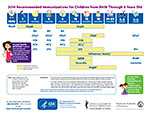Prevention
On This Page
The best way to prevent pneumococcal disease is to get the vaccine(s). Pneumococcal vaccines help protect against some of the more than 90 types of pneumococcal bacteria.
Vaccination
The pneumococcal conjugate vaccine (PCV13 or Prevnar 13®) protects against the 13 types of pneumococcal bacteria that cause most of the severe illness in children and adults. The vaccine can also help prevent some ear infections. CDC recommends PCV13 for all children at 2, 4, 6, and 12 to 15 months old. CDC also recommends PCV13 for adults 19 years or older with certain medical conditions and for all adults 65 years or older.
The pneumococcal polysaccharide vaccine (PPSV23 or Pneumovax 23®) protects against 23 types of pneumococcal bacteria. CDC recommends this vaccine for all adults 65 years or older. It is also recommended for children and adults 2 through 64 years old who are at increased risk for pneumococcal disease.
For more information on who should get either of these pneumococcal vaccines, see the childhood [4 pages] and adult [3 pages] immunization schedules, or talk to your doctor or nurse.
It is also important to get an influenza vaccine every year because having the flu increases your chances of getting pneumococcal disease.
Antibiotics
It’s not common for people to develop pneumococcal disease after being exposed to someone with a pneumococcal infection. Therefore, CDC does not recommend prophylactic (preventative) antibiotics for contacts of patients with such infections.
Previous Infection
Because there are more than 90 known pneumococcal serotypes (strains or types) that cause disease, a previous pneumococcal infection will not protect you from future infection. Therefore, CDC still recommends pneumococcal vaccines for children and adults who have had pneumococcal disease in the past.
Related Page
- Page last reviewed: September 6, 2017
- Page last updated: September 6, 2017
- Content source:


 ShareCompartir
ShareCompartir

